Editor’s Note: This is the twelfth chapter of William the Conqueror, by Jacob Abbot (published 1877).
XII. The Conclusion
From the time of the battle of Hastings, which took place in 1066, to that of William’s death, which occurred in 1087, there intervened a period of about twenty years, during which the great monarch reigned over his extended dominions with a very despotic sway, though not without a large share of the usual dangers, difficulties, and struggles attending such a rule. He brought over immense numbers of Normans from Normandy into England, and placed all the military and civil power of the empire in their hands; and he relied almost entirely upon the superiority of his physical force for keeping the country in subjugation to his sway. It is true, he maintained that he was the rightful heir to the English crown, and that, consequently, the tenure by which he held it was the right of inheritance, and not the right of conquest; and he professed to believe that the people of England generally admitted his claim. This was, in fact, to a considerable extent, true. At least there was probably a large part of the population who believed William’s right to the crown superior to that of Harold, whom he had deposed. Still, as William was by birth, and education, and language a foreigner, and as all the friends and followers who attended him, and, in fact, almost the whole of the army, on which he mainly relied for the preservation of his power, were foreigners too—wearing a strange dress, and speaking in an unknown tongue—the great mass of the English people could not but feel that they were under a species of foreign subjugation. Quarrels were therefore continually breaking out between them and their Norman masters, resulting in fierce and bloody struggles, on their part, to get free. These rebellions were always effectually put down; but when quelled in one quarter they soon broke out in another, and they kept William and his forces almost always employed.
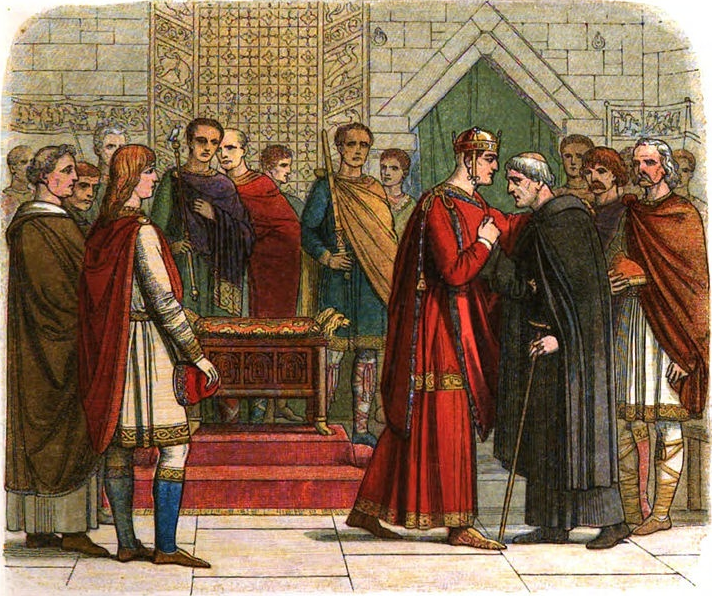
But William was not a mere warrior. He was well aware that the permanence and stability of his own and his successor’s sway in England would depend finally upon the kind of basis on which the civil institutions of the country should rest, and on the proper consolidation and adjustment of the administrative and judicial functions of the realm. In the intervals of his campaigns, therefore, William devoted a great deal of time and attention to this subject, and he evinced a most profound and statesmanlike wisdom and sagacity in his manner of treating it.
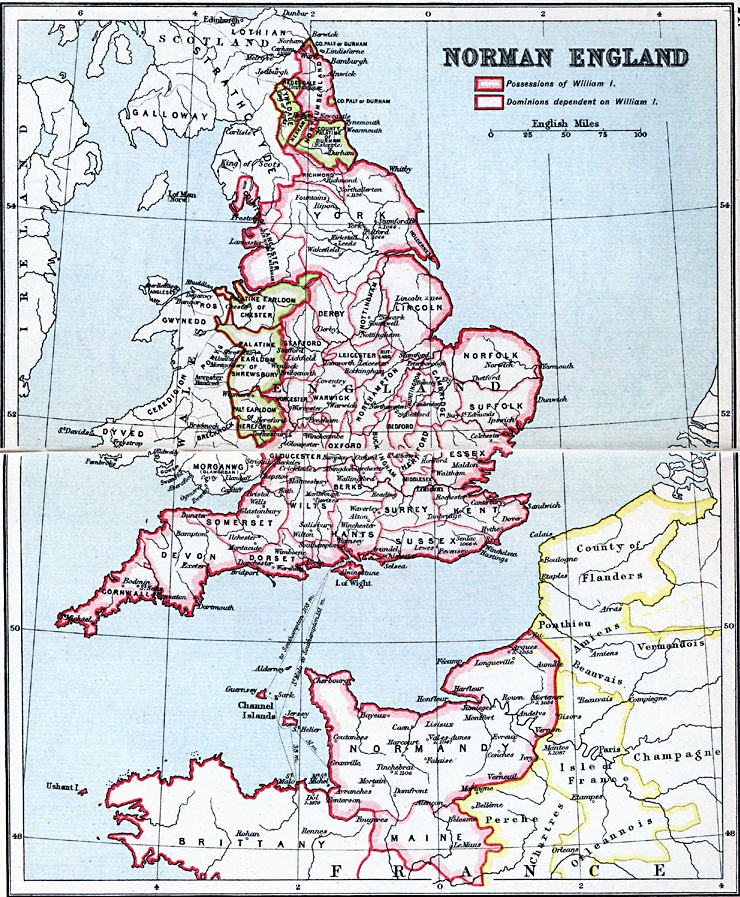
He had, in fact, a Herculean task to perform—a double task—viz, to amalgamate two nations, and also to fuse and merge two languages into one. He was absolutely compelled, by the circumstances under which he was placed, to grapple with both these vast undertakings. If, at the time when, in his park at Rouen, he first heard of Harold’s accession, he had supposed that there was a party in England in his favor strong enough to allow of his proceeding there alone, or with a small Norman attendance, so that he might rely mainly on the English themselves for his accession to the throne, the formidable difficulties which, as it was, he had subsequently to encounter, would all have been saved. But there was no such party—At least there was no evidence that there was one of sufficient strength to justify him in trusting himself to it. It seemed to him, then, that if he undertook to gain possession of the English throne at all, he must rely entirely on the force which he could take with him from Normandy. To make this reliance effectual, the force so taken must be an overwhelming one. Then, if Normans in great numbers were to go to England for the purpose of putting him upon the English throne, they must be rewarded, and so vast a number of candidates for the prizes of honor and wealth could be satisfied only in England, and by confiscations there. His possessions in Normandy would obviously be insufficient for such a purpose. It was evident, moreover, that if a large number of Norman adventurers were placed in stations of trust and honor, and charged with civil offices and administrative functions all over England, they would form a sort of class by themselves, and would be looked upon with jealousy and envy by the original inhabitants, and that there was no hope of maintaining them safely in their position except by making the class as numerous and as strong as possible. In a word, William saw very clearly that, while it would have been very well, if it had been possible, for him to have brought no Normans to England, it was clearly best, since so many must go, to contrive every means to swell and increase the number. It was one of those cases where, being obliged to go far, it is best to go farther; and William resolved on thoroughly Normanizing, so to speak, the whole British realm. This enormous undertaking he accomplished fully and permanently; and the institutions of England, the lines of family descent, the routine of judicial and administrative business, and the very language of the realm, retain the Norman characteristics which he ingrafted into them to the present day.
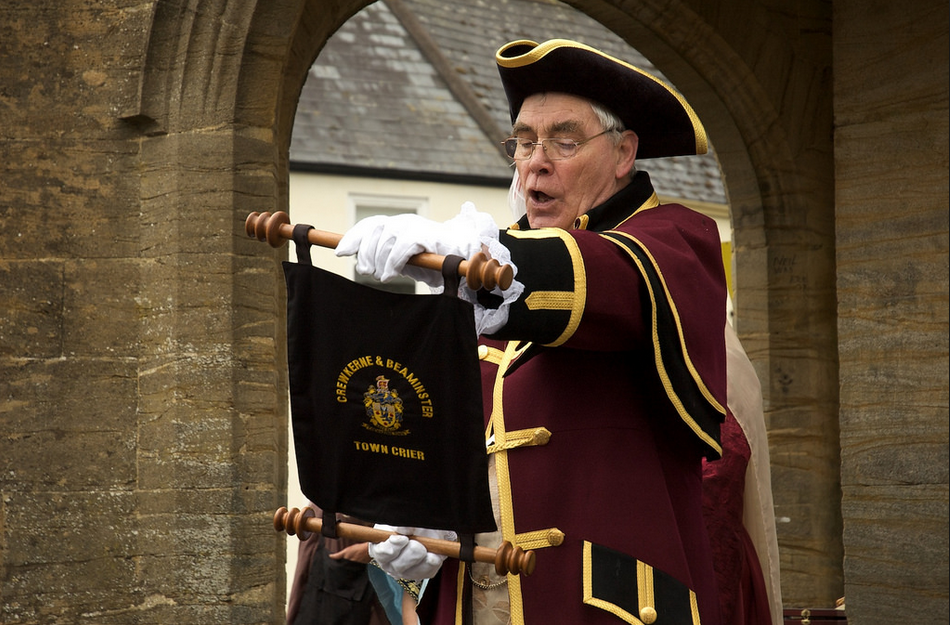
It gives us a feeling akin to that of sublimity to find, even in our own land, and in the most remote situations of it, the lingering relics of the revolutions and deeds of these early ages, still remaining, like a faint ripple rolling gently upon a beach in a deep and secluded bay, which was set in motion, perhaps, at first, as one of the mountainous surges of a wintery storm in the most distant seas. For example, if we enter the most humble court in any remote and newly-settled country in the American forests, a plain and rustic-looking man will call the equally rustic-looking assembly to order by rapping his baton, the only symbol of his office, on the floor, and calling out, in words mystic and meaningless to him, “O yes! O yes! O yes!” He little thinks that he is obeying a behest of William the Conqueror, issued eight hundred years ago, ordaining that his native tongue should be employed in the courts of England. The irresistible progress of improvement and reform have gradually displaced the intruding language again—except so far as it has become merged and incorporated with the common language of the country—from all the ordinary forms of legal proceedings. It lingers still, however, as it were, on the threshold, in this call to order; and as it is harmless there, the spirit of conservatism will, perhaps, preserve for it this last place of refuge for a thousand years to come, and “O yes” will be the phrase for ordaining silence by many generations of officers, who will, perhaps, never have heard of the authority whose orders they unwittingly obey.
The work of incorporating the Norman and English families with one another, and fusing the two languages into one, required about a century for its full accomplishment; and when at last it was accomplished, the people of England were somewhat puzzled to know whether they ought to feel proud of William’s exploits in the conquest of England, or humiliated by them. So far as they were themselves descended from the Normans, the conquest was one of the glorious deeds of their ancestors. So far as they were of English parentage, it would seem to be incumbent on them to mourn over their fathers’ defeat. It is obvious that from such a species of perplexity as this there was no escape, and it has accordingly continued to embarrass the successive generations of Englishmen down to the present day. The Norman Conquest occupies, therefore, a very uncertain and equivocal position in English history, the various modern writers who look back to it now being hardly able to determine whether they are to regard it as a mortifying subjugation which their ancestors suffered, or a glorious victory which they gained.
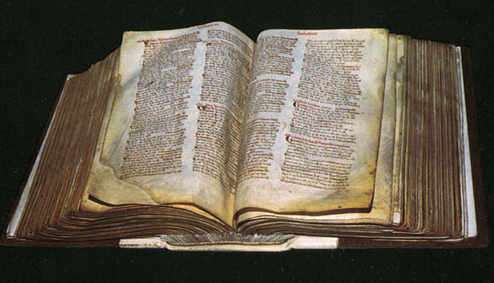
One of the great measures of William’s reign, and one, in fact, for which it has been particularly famous in modern times, was a grand census or registration of the kingdom, which the Conqueror ordered with a view of having on record a perfect enumeration and description of all the real and personal property in the kingdom. This grand national survey was made in 1078. The result was recorded in two volumes of different sizes, which were called the Great and the Little Domesday Book. These books are still preserved, and are to this day of the very highest authority in respect to all questions touching ancient rights of property. One is a folio, and the other a quarto volume. The records are written on vellum, in a close, abridged, and, to ordinary readers, a perfectly unintelligible character. The language is Latin; but a modern Latin scholar, without any means other than an inspection of the work, would be utterly unable to decipher it. In fact, though the character is highly wrought, and in some respects elegant, the whole style and arrangement of the work is pretty nearly on a par, in respect to scientific skill, with Queen Emma’s designs upon the Bayeux tapestry. About half a century ago, copies of these works were printed, by means of type made to represent the original character. But these printed editions were found unintelligible and useless until copious indexes were prepared, and published to accompany them, at great expense of time and labor.
Some little idea of the character and style of this celebrated record may be obtained from the following specimen, which is as faithful an imitation of the original as any ordinary typography will allow:
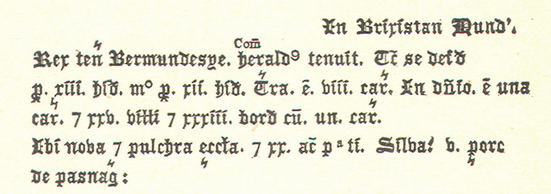
The passage, deciphered and expressed in full, stands thus—the letters omitted in the original, above, being supplied in italics:
“Rex tenet BERMUNDESYE. Heraldus comes tenuit. Tunc se defendebat pro xiii. hidis, modo pro xii. hidis, Terra est viii. carrucatarum. In dominio est una carrucata et xxv. Villani et xxxiii. bordarii cum una carrucata. Ibi nova et pulchra ecclesia, et xx. acrae prati, Silva v. porcis de pasnagio.”
(The king holds BERMUNDESYE. Earl HERALD held it (before). At that time it was rated at thirteen hides; now, at twelve. The arable land is eight carrucates (or plow-lands). There is one carrucate in demesne, and twenty-five villans, and thirty-three bordars, with one carrucate. There is a new and handsome church, with twenty acres of meadow, and woodland for five hogs in pasnage [pasturage] time.)
But we must pass on to the conclusion of the story. About the year 1082, Queen Matilda’s health began seriously to decline. She was harassed by a great many anxieties and cares connected with the affairs of state which devolved upon her, and arising from the situation of her family: these anxieties produced great dejection of spirits, and aggravated, if they did not wholly cause, her bodily disease. She was at this time in Normandy. One great source of her mental suffering was her anxiety in respect to one of her daughters, who, as well as herself, was declining in health. Forgetting her own danger in her earnest desires for the welfare of her child, she made a sort of pilgrimage to a monastery which contained the shrine of a certain saint, who, as she imagined, had power to save her daughter. She laid a rich present on the shrine; she offered before it most earnest prayers, imploring, with tears of bitter grief, the intercession of the saint, and manifesting every outward symbol of humility and faith. She took her place in the religious services of the monastery, and conformed to its usages, as if she had been in the humblest private station. But all was in vain. The health of her beloved daughter continued to fail, until at length she died; and Matilda, growing herself more feeble, and almost brokenhearted through grief, shut herself up in the palace at Caen.
It was in the same palace which William had built, within his monastery, many long years before, at the time of their marriage. Matilda looked back to that period, and to the buoyant hopes and bright anticipations of power, glory, and happiness which then filled her heart, with sadness and sorrow. The power and the glory had been attained, and in a measure tenfold greater than she had imagined, but the happiness had never come. Ambition had been contending unceasingly for twenty years, among all the branches of her family, against domestic peace and love. She possessed, herself, an aspiring mind, but the principles of maternal and conjugal love were stronger in her heart than those of ambition; and yet she was compelled to see ambition bearing down and destroying love in all its forms every where around her. Her last days were embittered by the breaking out of new contests between her husband and her son.
Matilda sought for peace and comfort in multiplying her religious services and observances. She fasted, she prayed, she interceded for the forgiveness of her sins with many tears. The monks celebrated mass at her bed-side, and made, as she thought, by renewing the sacrifice of Christ, a fresh propitiation for her sins. William, who was then in Normandy, hearing of her forlorn and unhappy condition, came to see her. He arrived just in time to see her die.
They conveyed her body from the palace in her husband’s monastery at Caen to the convent which she had built. It was received there in solemn state, and deposited in the tomb. For centuries afterward, there remained many memorials of her existence and her greatness there, in paintings, embroideries, sacred gifts, and records, which have been gradually wasted away by the hand of time. They have not, however, wholly disappeared, for travelers who visit the spot find that many memorials and traditions of Matilda linger there still.
William himself did not live many years after the death of his wife. He was several years older than she. In fact, he was now considerably advanced in age. He became extremely corpulent as he grew old, which, as he was originally of a large frame, made him excessively unwieldy. The inconvenience resulting from this habit of body was not the only evil that attended it. It affected his health, and even threatened to end in serious if not fatal disease. While he was thus made comparatively helpless in body by the infirmities of his advancing age, he was nevertheless as active and restless in spirit as ever. It was, however, no longer the activity of youth, and hope, and progress which animated him, but rather the fitful uneasiness with which age agitates itself under the vexations which it sometimes has to endure, or struggles convulsively at the approach of real or imaginary dangers, threatening the possessions which it has been the work of life to gain. The dangers in William’s case were real, not imaginary. He was continually threatened on every side. In fact, the very year before he died, the dissensions between himself and Robert broke out anew, and he was obliged, unwieldy and helpless as he was, to repair to Normandy, at the head of an armed force, to quell the disturbances which Robert and his partisans had raised.
Robert was countenanced and aided at this time by Philip, the king of France, who had always been King William’s jealous and implacable rival. Philip, who, as will be recollected, was very young when William asked his aid at the time of his invasion of England, was now in middle life, and at the height of his power. As he had refused William his aid, he was naturally somewhat envious and jealous of his success, and he was always ready to take part against him. He now aided and abetted Robert in his turbulence and insubordination, and ridiculed the helpless infirmities of the aged king.
While William was in Normandy, he submitted to a course of medical treatment, in the hope of diminishing his excessive corpulency, and relieving the disagreeable and dangerous symptoms which attended it. While thus in his physician’s hands, he was, of course, confined to his chamber. Philip, in ridicule, called it “being in the straw.” He asked some one who appeared at his court, having recently arrived from Normandy, whether the old woman of England was still in the straw. Some miserable tale-bearer, such as every where infest society at the present day, who delight in quoting to one friend what they think will excite their anger against another, repeated these words to William. Sick as he was, the sarcasm aroused him to a furious paroxysm of rage. He swore by “God’s brightness and resurrection” that, when he got out again, he would kindle such fires in Philip’s dominions, in commemoration of his delivery, as should make his realms too hot to hold him.
He kept his word—at least so far as respects the kindling of the fires; but the fires, instead of making Philip’s realms too hot to hold him, by a strange yet just retribution, were simply the means of closing forever the mortal career of the hand that kindled them. The circumstances of this final scene of the great conqueror’s earthly history were these:
In the execution of his threat to make Philip’s dominions too hot to hold him, William, as soon as he was able to mount his horse, headed an expedition, and crossed the frontiers of Normandy, and moved forward into the heart of France, laying waste the country, as he advanced, with fire and sword. He came soon to the town of Mantes, a town upon the Seine, directly on the road to Paris. William’s soldiers attacked the town with furious impetuosity, carried it by assault, and set it on fire. William followed them in, through the gates, glorying in the fulfillment of his threats of vengeance. Some timbers from a burning house had fallen into the street, and, burning there, had left a smoldering bed of embers, in which the fire was still remaining. William, excited with the feeling of exultation and victory, was riding unguardedly on through the scene of ruin he had made, issuing orders, and shouting in a frantic manner as he went, when he was suddenly stopped by a violent recoil of his horse from the burning embers, on which he had stepped, and which had been concealed from view by the ashes which covered them. William, unwieldy and comparatively helpless as he was, was thrown with great force upon the pommel of the saddle. He saved himself from falling from the horse, but he immediately found that he had sustained some serious internal injury. He was obliged to dismount, and to be conveyed away, by a very sudden transition, from the dreadful scene of conflagration and vengeance which he had been enacting, to the solemn chamber of death. They made a litter for him, and a corps of strong men was designated to bear the heavy and now helpless burden back to Normandy.
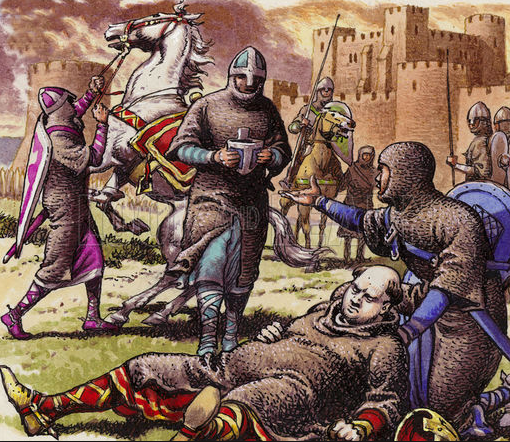
They took the suffering monarch to Rouen. The ablest physicians were summoned to his bed-side. After examining his case, they concluded that he must die. The tidings threw the unhappy patient into a state of extreme anxiety and terror. The recollection of the thousand deeds of selfish ambition and cruelty which he had been perpetrating, he said, all his days, filled him with remorse. He shrunk back with invincible dread from the hour, now so rapidly approaching, when he was to appear in judgment before God, and answer, like any common mortal, for his crimes. He had been accustomed all his life to consider himself as above all law, superior to all power, and beyond the reach of all judicial question. But now his time had come. He who had so often made others tremble, trembled now in his turn, with an acuteness of terror and distress which only the boldest and most high-handed offenders ever feel. He cried bitterly to God for forgiveness, and brought the monks around him to help him with incessant prayers. He ordered all the money that he had on hand to be given to the poor. He sent commands to have the churches which he had burned at Manes rebuilt, and the other injuries which he had effected in his anger repaired. In a word, he gave himself very earnestly to the work of attempting to, by all the means considered most efficacious in those days, to avert and appease the dreaded anger of heaven.
Of his three oldest sons, Robert was away; the quarrel between him and his father had become irreconcilable, and he would not come to visit him, even in his dying hours. William Rufus and Henry were there, and they remained very constantly at their father’s bed-side—not, however, from a principle of filial affection, but because they wanted to be present when he should express his last wishes in respect to the disposal of his dominions. Such an expression, though oral, would be binding as a will. When, at length, the king gave his dying directions in respect to the succession, it appeared that, after all, he considered his right to the English throne as very doubtful in the sight of God. He had, in a former part of his life, promised Normandy to Robert, as his inheritance, when he himself should die; and though he had so often refused to surrender it to him while he himself continued to live, he confirmed his title to the succession now. “I have promised it to him,” he said, “and I keep my promise; and yet I know that that will be a miserable country which is subject to his government. He is a proud and foolish knave, and can never prosper. As for my kingdom of England,” he continued, “I bequeath it to no one, for it was not bequeathed to me. I acquired it by force, and at the price of blood. I leave it in the hands of God, only wishing that my son William Rufus may have it, for he has been submissive to me in all things.” “And what do you give me, father?” asked Henry, eagerly, at this point. “I give you,” said the king, “five thousand pounds from my treasury.” “But what shall I do with my five thousand pounds,” asked Henry, “if you do not give me either house or land?” “Be quiet, my son,” rejoined the king, “and trust in God. Let your brothers go before you; your turn will come after theirs.”
The object which had kept the young men at their father’s bed-side having been now attained, they both withdrew. Henry went to get his money, and William Rufus set off immediately for England, to prepare the way for his own accession to the throne, as soon as his father should be no more.
The king determined to be removed from his castle in Rouen to a monastery which was situated at a short distance from the city, without the walls. The noise of the city disturbed him, and, besides, he thought he should feel safer to die on sacred ground. He was accordingly removed to the monastery. There, on the tenth of September, he was awakened in the morning by hearing the city bells ringing. He asked what it meant. He was told that the bells were ringing for the morning service at the church of St. Mary. He lifted up his hands, looked to heaven, and said, “I commend myself to my Lady Mary, the holy Mother of God,” and almost immediately expired.
The readers of history have frequent occasion to be surprised at the sudden and total change which often takes place at the moment of the death of a mighty sovereign, and even sometimes before his death, in the indications of the respect and consideration with which his attendants and followers regard him. In William’s case, as has happened in many other cases since, the moment he ceased to breathe he was utterly abandoned. Every body fled, carrying with them, as they went, whatever they could seize from the chamber—the arms, the furniture, the dresses, and the plate; for all these articles became their perquisites on the decease of their master. The almost incredible statement is made that the heartless monsters actually stripped the dead body of their sovereign, to make sure of all their dues, and left it naked on the stone floor, while they bore their prizes to a place of safety. The body lay in this neglected state for many hours; for the tidings of the great monarch’s death, which was so sudden at last, produced, as it spread, universal excitement and apprehension. No one knew to what changes the event would lead, what wars would follow between the sons, or what insurrections or rebellions might have been secretly formed, to break out suddenly when this crisis should have arrived. Thus the whole community were thrown into a state of excitement and confusion.
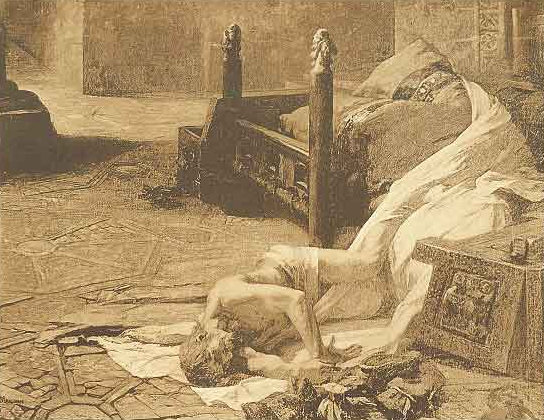
The monk and lay brethren of the monastery at length came in, took up the body, and prepared it for burial. They then brought crosses, tapers, and censers, and began to offer prayers and to chant requiems for the repose of the soul of the deceased. They sent also the Archbishop of Rouen, to know what was to be done with the body. The archbishop gave orders that it should be taken to Caen, and be deposited there in the monastery which William had erected at the time of his marriage.
The tale which the ancient historians have told in respect to the interment is still more extraordinary, and more inconsistent with all the ideas we naturally form of the kind of consideration and honor which the remains of so great a potentate would receive at the hands of his household and his officers of state, than the account of his death. It is said that all the members of his household, and all his officers, immediately after his decease, abandoned the town—all eagerly occupied in plans and maneuvers to secure their positions under the new reign. Some went in pursuit of Robert, and some to follow William Rufus. Henry locked up his money in a strong box, well ironed, and went off with it to find some place of security. There was nobody left to take the neglected body to the grave.
At last a countryman was found who undertook to transport the heavy burden from Rouen to Caen. He procured a cart, and conveyed it from the monastery to the river, where it was put on board a vessel, and taken down the Seine to its mouth, and thence by sea to Caen. The Abbot of St. Stephen’s, which was the name of William’s monastery there, came, with some monks and a procession of the people, to accompany the body to the abbey. As this procession was moving along, however, a fire broke out in the town, and the attendants, actuated either by a sense of duty requiring them to aid in extinguishing the flames, or by curiosity to witness the conflagration, abandoned the funeral cortège. The procession was broken up, and the whole multitude, clergy and laity, went off to the fire, leaving the coffin, with its bearers, alone. The bearers, however, went on, and conveyed their charge to the church within the abbey walls.
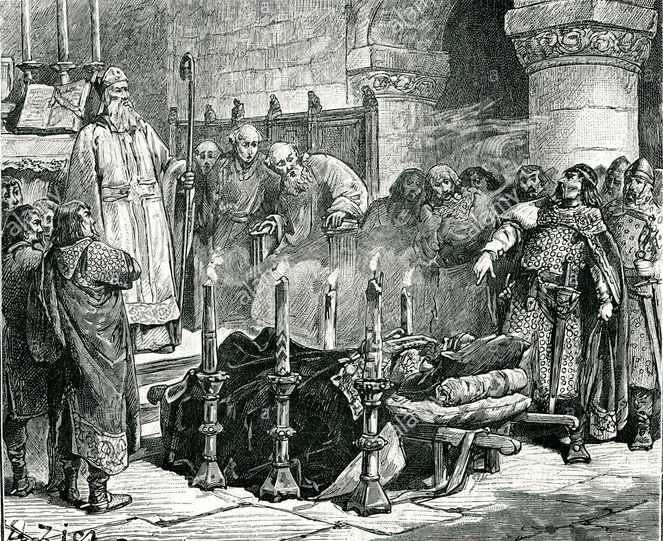
When the time arrived for the interment, a great company assembled to witness the ceremonies. Stones had been taken up in the church floor, and a grave dug. A stone coffin, a sort of sarcophagus, had been prepared, and placed in the grave as a receptacle for the body. When all was ready, and the body was about to be let down, a man suddenly came forward from the crowd and arrested the proceedings. He said that the land on which the abbey stood belonged to him; that William had taken forcible possession of it, for the abbey, at the time of his marriage; that he, the owner, had been compelled thus far to submit to this wrong, inasmuch as he had, during William’s life-time, no means of redress, but now he protested against a spoliation. “The land,” he said, “is mine; it belonged to my father. I have not sold it, or forfeited it, nor pledged it, nor given it. It is my right. I claim it. In the name of God, I forbid you to put the body of the spoiler there, or to cover him with my ground.”
When the excitement and surprise which this denunciation had awakened had subsided a little, the bishops called this sudden claimant aside, examined the proofs of his allegations, and, finding that the case was truly as he stated it, they paid him, on the spot, a sum equal to the value of ground enough for a grave, and promised to take immediate measures for the payment of the rest. The remonstrant then consented that the interment might proceed.
In attempting to let the body down into the place prepared for it, they found that the sarcophagus was too small. They undertook to force the body in. In attempting this, the coffin was broken, and the body, already, through the long delays, advanced in decomposition, was burst. The monks brought incense and perfumes, and burned and sprinkled them around the place, but in vain. The church was so offensive that every body abandoned it at once, except the workmen who remained to fill the grave.
While these things were transpiring in Normandy, William Rufus had hastened to England, taking with him the evidences of his father’s dying wish that he should succeed him on the English throne. Before he reached head-quarters there, he heard of his father’s death, and he succeeded in inducing the Norman chieftains to proclaim him king. Robert’s friends made an effort to advance his claims, but they could do nothing effectual for him, and so it was soon settled, by a treaty between the brothers, that William Rufus should reign in England, while Robert was to content himself with his father’s ancient domain of Normandy.

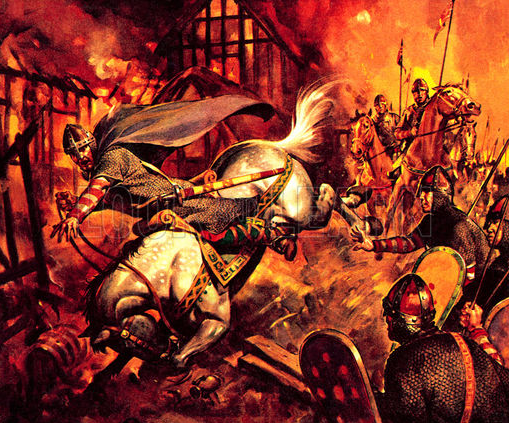


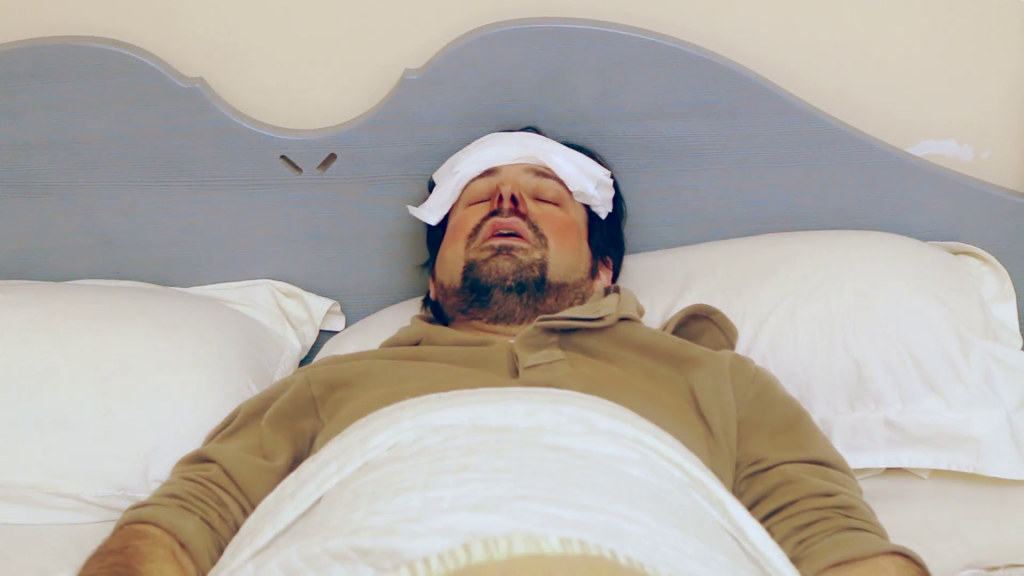





[…] Source link […]
5